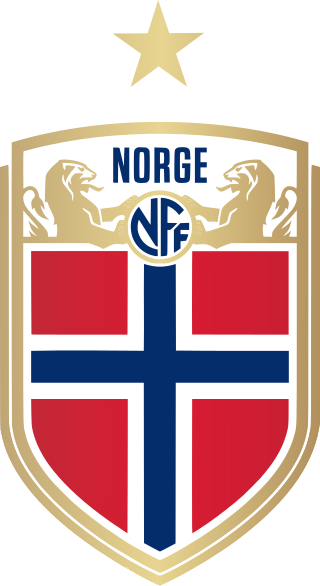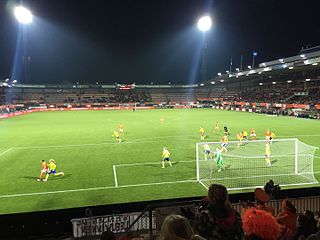
The Rugby World Cup is a men's rugby union tournament contested every four years between the top international teams. The tournament is administered by World Rugby, the sport's international governing body. The winners are awarded the Webb Ellis Cup, named after William Webb Ellis who, according to a popular legend, invented rugby by picking up the ball during a football game.

The Norway women's national football team is controlled by the Football Association of Norway. The team is former European, World and Olympic champions and thus one of the most successful national teams. The team has had less success since the 2011 FIFA Women's World Cup.
The CONCACAF W Championship is an association football competition organized by the Confederation of North, Central American and Caribbean Association Football (CONCACAF) that often serves as the qualifying competition to the Women's World Cup, and recently the Olympics. In years when the tournament has been held outside the World Cup qualifying cycle, non-CONCACAF members have been invited. CONCACAF is the governing body for football for North America, Central America and the Caribbean. The most successful country has been the United States, winning their ninth title in 2022.
The 1991 FIFA Women's World Cup qualification process saw 48 teams from the six FIFA confederations compete for the 12 places in the 1991 FIFA Women's World Cup finals. The places were divided as follows:
The CONCACAF Women's Olympic Qualifying Tournament was an international football (soccer) event in the North America, Central America and the Caribbean region, and was the qualification tournament for the Olympic Games.
Qualification for the 2011 FIFA Women's World Cup determines which 15 teams join Germany, the hosts of the 2011 tournament, to play for the Women's World Cup. Europe has 5.5 qualifying berths, Asia 3 berths, North and Central America 2.5 berths, Africa 2 berths, South America 2 berths and Oceania 1 berth. The 16th spot was determined through a play-off match between the third-placed team in North/Central America and the winner of repechage play-offs in Europe.

The Australia women's national soccer team is overseen by the governing body for soccer in Australia, Football Australia, which is currently a member of the Asian Football Confederation (AFC) and the regional ASEAN Football Federation (AFF) since leaving the Oceania Football Confederation (OFC) in 2006. The team's official nickname is "the Matildas" ; they were known as the "Female Socceroos" before 1995.

The football tournament at the 2000 Summer Olympics was the second edition of the women's Olympic football tournament and was held from 13 to 28 September 2000. It was hosted at three venues along the Eastern side of Australia with matches being held in Sydney, Canberra and Melbourne.
Twelve teams competed in the women's football tournament at the 2016 Summer Olympics. In addition to host nation Brazil, 11 women's national teams qualified from six separate continental confederations.

The 2016 UEFA Women's Olympic Qualifying Tournament was an international football competition organised by UEFA to determine the final women's national team from Europe to qualify for the 2016 Summer Olympics women's football tournament in Brazil. The tournament was played between 2 and 9 March 2016 in the Netherlands.
The 2019 FIFA Women's World Cup qualification process decided all 24 teams which played in the 2019 FIFA Women's World Cup, with the hosts France qualifying automatically. It is the eighth FIFA Women's World Cup, the quadrennial international women's football world championship tournament. The tournament is the third to be hosted in Europe, after the 1995 FIFA Women's World Cup in Sweden and the 2011 FIFA Women's World Cup in Germany.
The 2018 OFC Women's Nations Cup qualification tournament was a football competition that took place from 24 to 30 August 2018 in Lautoka, Fiji to determine the final women's national team which joined the seven automatically qualified teams in the 2018 OFC Women's Nations Cup final tournament in New Caledonia.
The 2023 FIFA Women's World Cup qualification process determined 30 of the 32 teams which will play in the 2023 FIFA Women's World Cup, with the co-hosts Australia and New Zealand qualifying automatically. It is the ninth FIFA Women's World Cup, the quadrennial international women's football world championship tournament. The tournament is the first Women's World Cup to be hosted in multiple countries, the third by an AFC member association after the 1991 and 2007 Women's World Cups in China, the first to be held in the Southern Hemisphere, the first senior FIFA tournament in Oceania, and also the first FIFA tournament to be hosted across multiple confederations.

England have participated six times at the FIFA Women's World Cup: in 1995, 2007, 2011, 2015, 2019, and 2023. They have reached the quarter-finals in each of their participation and the semi-finals three times, reaching the final in 2023.
The Norway women's national football team has represented Norway at the FIFA Women's World Cup on nine occasions in 1991, 1995, 1999, 2003, 2007, 2011, 2015, 2019 and 2023. They were runners up in 1991. They won the following tournament in 1995. They also reached the fourth place in 1999 and in 2007.

Brazil competed at the 2020 Summer Paralympics in Tokyo, Japan from 24 August to 5 September 2021.

The Sweden women's national football team has represented Sweden at the FIFA Women's World Cup on nine occasions in 1991, 1995, 1999, 2003, 2007, 2011, 2015, 2019 and 2023. There were runners up once and four times bronze medalists: in 1991, in 2011, in 2019 and in 2023.
Eight teams competed in the women's football tournament at the 1996 Summer Olympics. In addition to the host nation, the United States, seven other teams qualified for the tournament based on the results from the 1995 FIFA Women's World Cup.
Twelve teams are scheduled to compete in the women's football tournament at the 2024 Summer Olympics. In addition to France, the host nation, 11 women's national teams will qualify from six separate continental confederations.
Association football is among the most popular sports in Europe, with fourteen members of the Union of European Football Associations having competed at the sport's biggest international event, the FIFA Women's World Cup. The highest ranked result in the Women's World Cup for a European team is 1st place in the 1995, 2003, 2007 and 2023 FIFA Women's World Cups by Norway, Germany and Spain.









